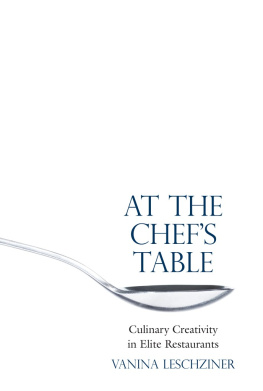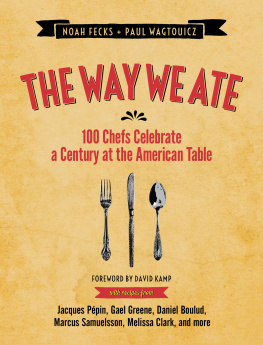Stanford University Press
Stanford, California
2015 by the Board of Trustees of the Leland Stanford Junior University. All rights reserved.
No part of this book may be reproduced or transmitted in any form or by any means, electronic or mechanical, including photocopying and recording, or in any information storage or retrieval system without the prior written permission of Stanford University Press.
Printed in the United States of America on acid-free, archival-quality paper
Library of Congress Cataloging-in-Publication Data
Leschziner, Vanina, author.
At the chefs table : culinary creativity in elite restaurants / Vanina Leschziner.
pages cm
Includes bibliographical references and index.
ISBN 978-0-8047-8797-0 (cloth : alk. paper)
1. Celebrity chefsUnited States. 2. Creative ability in cookingUnited States. I. Title.
TX649.A1L47 2015
641.5092'2dc23
2015004654
ISBN 978-0-8047-9549-4 (electronic)
Typeset by Bruce Lundquist in 10.5/15 Adobe Garamond
Acknowledgments
Writing a book is unlike professional cooking in most respects. Above all, I could hardly expect this book to offer even a fraction of the pleasure I have had eating at many of the best restaurants in New York City and San Francisco during the fieldwork that led to the book. But writing a book is like professional cooking in that the final product is associated with an author, even though it is the outcome of a collective endeavor. Nobody was more indispensable for making this book possible than the chefs who gave of their time generously, allowed me to prod them with questions, and gave me access to their kitchens to watch how they worked, even during the busiest times. Elite chefs are constantly approached for interviews by high-profile media so I am grateful that they agreed to my requests for interviews, even though they got nothing in return. Unfortunately, the mores of sociological research prevent me from acknowledging chefs by name, which is particularly regrettable in the case of those chefs who, beyond agreeing to be interviewed, let me observe the kitchen during dinner service and invited me to observe other parts of their work (staff meetings, visits to farmers markets, work on new dishes). The biggest thanks are due to those who called up their friends to tell them that giving me an interview was worthwhile. Without their help, I would not have had access to some of the chefs who were critical to a study of high cuisine in New York and San Francisco.
Much intellectual, professional, and emotional support made this book possible. Nobody deserves more gratitude than John Levi Martin, who has long been a mentor. Johns contributions to my work and well-being far exceed what could be acknowledged in these pages. I could have not dreamt of more or better intellectual and professional advice and support, nor of a more unwavering friendship.
I am also fortunate to have met Karen Cerulo, Paul McLean, and Ann Mische, whose input is all over this book. I am grateful to Viviana Zelizer for her early feedback, and to Eviatar Zerubavel for his support during my time at Rutgers. A special thank you to Karen, who is always there when I need her advice.
Over the years since this project started many people have contributed to it in all sorts of ways. Some read and commented on one, various, or all chapters; others helped through discussions and conversations; still others offered advice or support; and quite a few provided welcome and necessary distractions along the way. Thanks go to all my friends who have served as regular reminders that there is an exciting life besides book writing. Here, I wish to thank those who have given feedback or support for this book: Shyon Baumann, Claudio Benzecry (a big thank you for reading the whole manuscript!), Joseph Bryant, Clayton Childress, Eduardo de la Fuente, Mustafa Emirbayer, Rick Fantasia, James Farrer, Priscilla Ferguson, Adam Green, James Jasper, Sherri Klassen, Anna Korteweg, Monika Krause, Jennifer Lena, Paul Lichterman, Omar Lizardo (a special thank you for various readings in addition to the whole manuscript!), Jeff Manza, Alexandra Marin, Neil McLaughlin, Ashley Mears, Daniel Menchik, Philippe Monin, Craig Rawlings, Arturo Rodrguez Morat, Krishnendu Ray, Erik Schneiderhan, Daniel Silver, Jeremy Tanner, and Andreas Wimmer.
I have also benefitted from the feedback of audiences at conferences where I presented parts of this book, including several American Sociological Association annual meetings, Eastern Sociological Society annual meetings, International Sociological Association Forums of Sociology, and also at invited presentations, colloquia, and workshops at McMaster University, Rutgers University, Sophia University, the University of California, Los Angeles, the University of Chicago, the University of St. Andrews, the University of Toronto, and Yeshiva University.
The research for this book was supported, at various stages of the process, by an award from the Graduate School at Rutgers University, a fellowship from the Center for Cultural Analysis at Rutgers University and a Connaught Fund start-up award and other research support from the University of Toronto. Four graduate students helped with research for this bookthank you to Terran Giacomini, Sarah Knudson, Lance Stewart, and Lawrence Williams.
Two anonymous reviewers for Stanford University Press took the time and effort to read the manuscript carefully (and promptly), and provided thorough and insightful feedback that greatly helped to improve the book. If I ever had an ideal of an editor, Kate Wahl, my editor at Stanford University Press, is that ideal personified. Her advice and support has been constant and wonderful in every single instance, and her endless patience and positive disposition are beyond my comprehension. Thanks are due also to Elspeth MacHattie and Gigi Mark at Stanford University Press.
I wish to dedicate this book to the memory of my mother, Gisle Ebel, who loved food and books almost as much as she loved people. She put up with me as I worked through many drafts of this book, but regrettably, did not live to see that work finally come to fruition.
Preface
This book is about the creative work of chefs at elite restaurants in New York and San Francisco, an empirical subject I chose in order to examine the (much more abstract) analytical question of how and why individuals act the way they do. Areas of life rife with ambiguity, uncertainty, high pressure, and contradictory forces are especially good for exploring how individuals make choices about their actions. Creative work in cultural spheres is one such case. In such work it is not always easy to make products that satisfy the taste of audiences and create something original. In addition, the evaluation of quality is not clear-cut but has the power to make or break ones career nonetheless. Creators must navigate competing forcesincluding their own habits and inclinations, economic pressures, and status constraintsin coming up with new ideas and managing their careers.
Why explore these issues in high cuisine? When I began the research that led to this book, chefs work was still largely unexplored in sociological and organizational research (particularly in the Anglo-Saxon world), so there was much to learn. In the world of elite restaurants, there are especially strong and competing pressures to have a creative and distinctive style and at the same time to navigate market forces to run a profitable business (of a type characterized by high costs and low profit margins). That creativity and commercial forces are both at the center of chefs jobs means that chefs have to make difficult choices to manage their work and careers. For analytical purposes, it means that high cuisine combines areas that are often separated in scholarly research, namely the business world and the spheres of culture and the arts. Chefs cannot choose either the value of artistry or the incentives of the economic market. That is, there may be starving artists, willing to forgo material comforts for the sake of their art, but there cannot be such a thing as a starving chef (a metaphor that surely applies to more than economics when it comes to chefs). Chefs risk not only losing their restaurants if they cannot run a profitable business but also damaging their reputations. These conditions turn the world of elite restaurants into a particularly good case for studying the dynamics of cultural creation and examining the major theories and perspectives that we use to explain the workings of cultural spheres and organizational configurations.






